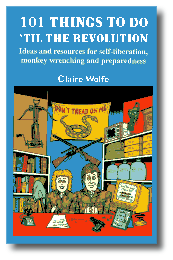Gulching refers to the act of forming a localized, underground economic and social community of libertarian-minded individuals. The term comes from Galt's Gulch, the fictional village of economic outlaws in Ayn Rand's novel, Atlas Shrugged. In the novel, Galt's Gulch was hidden in the Rocky Mountains and protected by a holographic shield so perfect it was called "almost magical". Modern gulching typically occurs in remote areas, but can also take place in suburbs, urban areas, or even online. These underground communities are called "gulches," and the inhabitants and participants are called "gulchers." Exact statistics on gulching's prevalence are unavailable, as privacy is usually paramount to gulchers. Gulching has been promoted and popularized by libertarian writer Claire Wolfe and is a major topic on the Internet forum founded for readers of her work.
Description
Gulchers trade and barter with each other outside of government regulation and tax systems. The intent is to create a greater degree of economic and personal freedom, while building a trust-based local trade network to provide goods and services that might become unavailable if the mainstream economy collapses. Self-sufficiency as a whole, in terms of food, energy, fiber, shelter, health care, and other production and services is considered valuable, even vital, to a free existence. Gulchers are also free to trade outside of the gulch, though a remote location might make this difficult.
A gulch differs from a commune in that it is libertarian, and so upholds individual and property rights rather than operating by the rules of community property. Participants remain free to own property, to earn and to keep their own wealth, and to live their days as they see fit, rather than by rules imposed by a common community. There may be some mutually accepted plan to share chores or self-defense duties, but in the main, gulchers tend to prefer minimal rules, believing that free individuals will always create better solutions to the questions facing them. Those who seek to participate in a gulch generally adhere to the Zero Aggression Principle and have no wish to harm or attack others who choose to live differently. They believe in self-defense if first aggressed upon by others.
Writer Taran Jordan describes a gulch as "a place where one stores needed supplies to last a certain length of time, until one has arranged to produce as many of those supplies as possible once that initial time runs out, one has made contacts with other likeminded folks to band together in the interests of future production, trade, and the defense of the produce, its means of production, and its producers, one can enjoy the fruits of one’s labor, and life at the pace of nature, free from those who do not choose this way of life."
The Gulcher's Guide, by Claire Wolfe and Mary Lou Seymour, recommends locating gulches at least 100 miles from any major city, in the event that a catastrophe causes refugees to spill out of the city in search of food, loot, and refuge. The choice of location involves tradeoffs that affect suitability for gulching. For instance, while the intermountain west is perceived as relatively friendly to the goals of gulchers, it also suffers from lack of water, harsh climates and poor agricultural conditions.
Since gulchers may need to sacrifice many conveniences associated with the above-ground economy, Wolfe considers the most crucial characteristic of a potential gulcher to be adaptability. Gulchers typically eschew banks, preferring to barter or use gold and silver as currencies. Wolfe notes that gulchers may have to rely on anonymous advertisements to find customers and services, e.g.:
- Chiropractor needed for individual in Coos County, New Hampshire.
- Internist and full range of clinic services available to gold-paying customers in Pocatello, Idaho.
- Purestrain metal appraisal available in exchange for radiation therapy.
A variation on gulching, done as a single individual, offers five courses of action to consider:
- Refuse to engage in any implementation of your personal creative ability which benefits the State.
- Take your brains off the statist marketplace.
- Act so that only those who add to your life, not those who devour it, comprise your creativity marketplace.
- Reserve your achievements for yourself and those who will join you in the endeavor to build a sane and sensible world.
David King calls this "Shrugging".
Gulching in Fiction
- Atlas Shrugged, a novel by Ayn Rand where the term originated.
- Bioshock (2007) , a video game by 2K Games that is set in a gulched, underwater technocraterian society.
